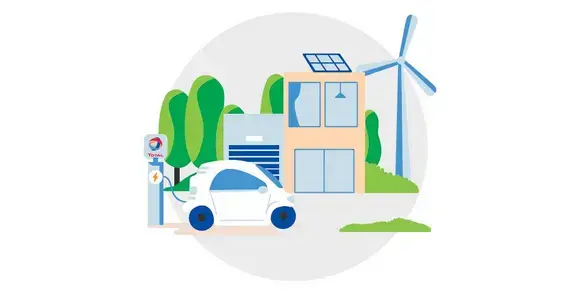
TotalEnergies offers solar power plants with or without battery storage for electricity production.
The offer in question is a ground-mounted solar power plant hybridized to the generators of the Rite Foods factory located northwest of Lagos, the economic capital of Nigeria. This factory is an off-grid site, i.e. it is not connected to the national electricity grid.
This solar power plant delivers the power of 1 MWp. Its production corresponds to 12% of the site's consumption (of 11GWh at the time of its design). It was commissioned in February 2019 for a planned operating period of at least 25 years.
The TotalEnergies Ecosolutions advantage
The Rite Foods PV hybrid plant produces renewable electricity. It switches part of the electricity consumption of the Rite Foods factory, which ran exclusively on diesel and gas generators.
Considering Nigeria's potential resources, renewable energy would be an interesting and necessary alternative or complement to increase production capacity and reduce grid issues. In addition, some companies are turning to renewable solutions to reduce their costs and improve their autonomy.
On the one hand, Nigeria's energy mix is largely based on fossil fuels (gas-fired thermal capacity (81% of the electricity mix) and hydro (19%) (2019 figures from a study by the Abuja Regional Economic Service). On the other hand, access to energy is a central issue in the country, with about 55% of the population reportedly lacking access to electricity. In addition, there are major inequalities between cities and rural areas, where the rate of access to electricity drops to 36%.
The Environmental Performance
Compared to the baseline scenario of generating electricity without the use of the hybrid solar plant, i.e., from natural gas (64%) and diesel (36%), the Rite Foods’ hybrid solar plant allows:
-
A 97% reduction in greenhouse gas emissions for 1kWh of electricity produced per year
This result is based on a cradle-to-grave Life Cycle Assessment (LCA) study, which evaluates the potential environmental impacts associated with the electricity generated by a 1MW capacity photovoltaic power plant, made up of Sunpower P19 modules, throughout its life cycle. The comparison with the previous situation is based on the following functional analysis: "Produce 1kWh of electricity per year that takes into account the 25-year lifetime of the hybrid solar plant"
External External
Indepedendent auditor EY has verified that this product was labeled according to the method described in the TotalEnergies Ecosolutions Guidelines and that the guidelines comply with the principles set out in the ISO 14020 and 14021 standards which govern environmental claims and particularly their accuracy.
Plus d'informations
- Label Award Date : March 2021 - Guidelines v7
- Label term : December 2025
- Geographical scope : Rite Foods plant in Nigeria, for off-grid use

Approach & label
Ecosolutions program by TotalEnergies enables our customers to consume less and better.

Our Ecosolutions in brief
Learn more about the emblematic ranges of the Ecosolutions label by TotalEnergies.

Beyond the label : our complementary approach "Eco-Impact"
The Eco-impact approach is a new complementary and experimental pilot program, launched with the support of external stakeholders.